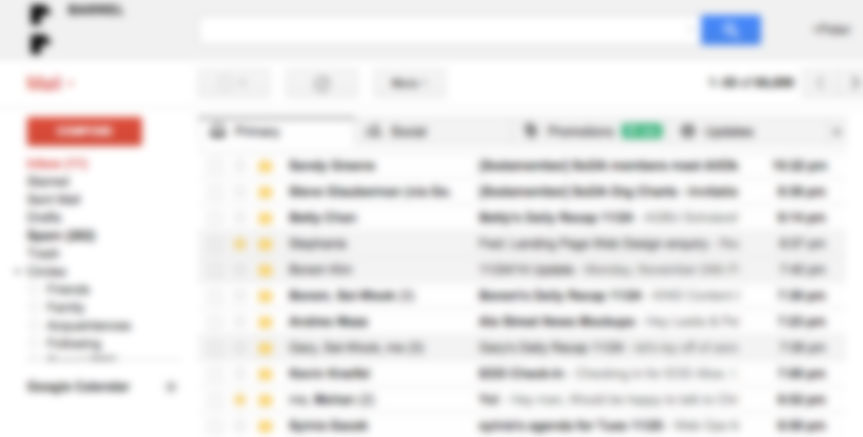I’ve been thinking about how I spend my time since I finally got around to reading Tim Ferriss’s The 4-Hour Workweek. One part that really resonated with me was a suggestion in the book to ask yourself, 3 times a day: “Am I being productive, or just active? Am I inventing things to do, to avoid the important?”
I first thought about the most productive day of the week for me: Sunday. Every Sunday afternoon, I spend 2-3 hours planning for the upcoming week, writing down thoughts, reviewing the previous week’s business activity, reading industry material, and creating agendas for various meetings. This short burst of concentration helps me get more things done in an afternoon than I would in a 10-hour workday.
One big reason for my Sunday productivity is that there are very few emails coming in and zero activity in our company chatrooms. I’m also not getting any instant messages from my team or having to attend meetings. The 2-3 hours are mostly disruption-free (except when my dog Sidney begs to play fetch).
I know that email is probably the #1 culprit of disruption for me each day. It’s been a few years since I turned off buzz notification on my smartphone, but I’m not sure that it’s reduced the habit. I’ve experimented with designated times for accessing my inbox to limit incessant checking, but such attempts have always been derailed by some “emergency” that’s required my immediate attention. These days, the best I can do is not check email until I’ve at least gotten out of bed and brushed my teeth. I know, it’s sad.
The problem with checking my email is that it really doesn’t contribute to my productivity. There are certainly messages to reply to and decisions to make, but these activities get in the way of what’s really important. My energies are best spent planning for new business development opportunities, designing processes, and taking the time to thoroughly review and comment on our team’s output. Other valuable activities include writing thought leadership pieces, refining our marketing language, or testing out new tools and platforms. But too often, I find myself spreading the activity of checking and replying to emails throughout the day rather than batching them into intense, high-focus sessions. And if I run out of emails, I’m on Twitter or LinkedIn, browsing people’s profiles and going down the rabbit hole of listicles and generic business advice articles. The important work usually get delayed or shelved. I sometimes find myself waiting until Sunday to get such work done. What’s the point of getting to work early and staying late?
Today was an exception. I had a presentation to make at 3PM. When I came into work this morning, I had exactly zero slides prepared. I also had to brief one of my designers to create mockups. Out of necessity, I had to focus 100% of my attention on the presentation. I neglected my inbox and pumped out slide after slide. At no point did I drift off and check ESPN.com or log on to Twitter. What would normally have taken me a good 4-5 hours took me less than 2. I finished the bulk of the work in no time, gave feedback on the mockups, and had enough time to practice and refine the deck. I felt like I had all the time in the world, and it was a very luxurious feeling. After the presentation, I went back to my desk and went through all of my emails at once. That, too, felt very satisfying and was way more efficient than if I had checked them piecemeal throughout the day.
So what does this all mean? I think there are still many issues I need to address and understand better. For example: why is it that I feel like I need to be so available by email? Do I feel like I’m being rude if I don’t reply to emails quickly? Am I worried that things won’t get done if I’m not able to reply and make decisions? Am I worried that my team will mess up without my supervision?
Underlying my email problem is a management problem. I don’t think I’m doing enough to build systems to empower people to do things without my input. As much as I think I’ve improved over the years, there’s still a big part of me that’s a micro-manager. The micro-manager in me doesn’t burn with the same intensity as I did when I first started Barrel, but I’m still far from being a trusting, big-picture executive. There’s important work to do to improve this.
Tim Ferriss has another nugget that I found helpful to contemplate: “There should never be more than two mission-critical items to complete each day. Do them separately, from start to finish, without distraction.”
Each day, I hustle and try to knock out as many items from my To Do list as possible. But many of the items on there are hardly mission-critical. Some, now that I think about it, are straight up distractions and don’t deserve my time. Old habits die hard, but I’m feeling a greater sense of urgency to change my ways. It’s hard to lead when I’m constantly inventing work for myself so that I may avoid the important. The important things are hard. I know that my mission-critical items will take a lot of thinking and concentration. The hardest thing will be to trade my existing set of habits for new ones. Will I have the resolve and discipline to make this happen?
